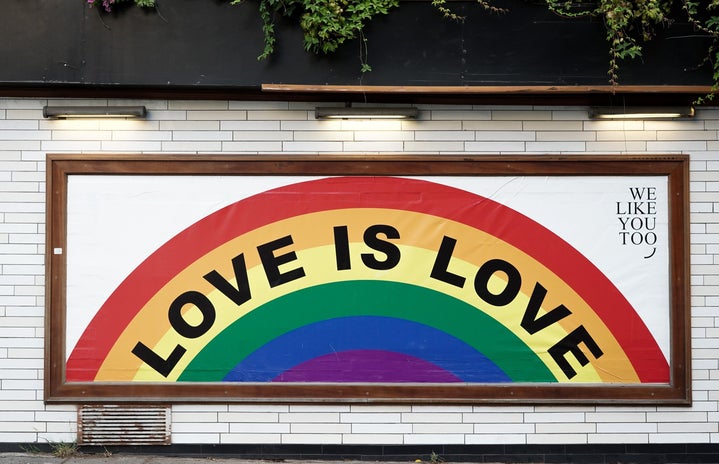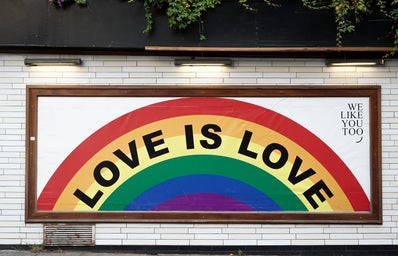By: Victoria Merianos
Does God hate me because I am gay? As a member of the LGBTQ+ community, I decided to find out. Though my knowledge of religion is limited, it seems as though people who have ventured into the online world think that religious folks would not approve of the LGBTQ+ community. I know that stereotypically, religion, particularly Christianity, is known for being less than accepting of their members. The people I spoke to were raised or associated with a form of Christian beliefs.
Vlada Moroz is an English major at Ryerson University. She was raised Russian Orthodox, which falls under the Christian beliefs. For her, coming out to her family is not an option. Her religion views homosexuality as something to be eradicated. She finds her religious beliefs contradict itself when saying, “God loves everyone.” She explained that for her family, the slang word for homosexuals is “pedophile race.” She, of course, does not agree with their views. She says she used to be homophobic herself. “It’s all learned behaviours; no one is born homophobic.” When she discovered her attraction to women, she had to rethink what she has been raised to believe. “It’s hard to unlearn it,” she said.
She asked her brother once what he would do if his sister were gay. He responded that he would ship her back to Russia, make sure they all knew she was a member of the LGBTQ+ community and put her in a conversion camp until she was straight. Therefore, she says, unless she ends up engaged to a woman while being completely independent, she will never tell her family. She said she would be kicked out if she came out, and lives in fear of exposure. “There’s a chance I could be beaten within an inch of my life,” she said. “I’m not hyperbolic. They cannot find out.”
I asked her if the Bible really is against homosexuals, as she has been raised in the religion and attended Catholic school. Moroz explained that the text had been misinterpreted and mistranslated. “It’s the people and power with authority that say what this means, this is how you should all read this and they’re the ones that establish what is or isn’t,” she said. She further explains that Jesus was known for spending time with all kinds of people. “That’s what Jesus said, love the people that are the most marginalized in society. I think religion tends to forget that,” she said.
Eduard Tatomir grew up religious, with his father still practicing at times. He is not a religious person currently, but has knowledge and respect for it. He was outed by an ex but says if he wasn’t, he might still be in the closet.
Tatomir explained that things he read on the internet seemed to indicate to him that God’s views on his homosexuality would not accept him. Though his Catholic school had people open about their sexuality, his parents did not mention it when he came out. He said what he read online may have subconsciously turned him off to religion. He also agreed that it is hard to get out of that kind of mindset.
The Q Christian Fellowship is an organization that acknowledges the mixed views regarding religion and the LGBTQ+ community, and tries to help people whose families are less than accepting. Nathanial Green, communications manager for Q Christian Fellowship, explained how people misinterpret the Bible.
“People just assume the Bible outright condemns LGBTQ+ identity,” he said. He said if people take into account the characters, context and who is writing it, the interpretation is less clear. “A lot of it has to do with how it has been historically slated and the assumptions that are baked into it,” he said. “When Paul uses language that is translated to say God doesn’t include or God does not affirm people like us, the language is very much in line with an exploited reality.”
He said people have a very flat reading of the text and “it’s easy to read the text in a black and white way that makes a non-affirming position plausible.” He explained that taking the translation and applying it to our modern beliefs can make people assume the intention of the writer and their work. He said we cannot just look at the text and assume something about it that may not be true, “particularly when the costs of the assumption are the death, suicide, depression, loss, anxiety – the trauma of all kinds.”
When asked if the pain that people go through being rejected by their family is due to their sexuality, he responded that “the will of God is the flourishing of humankind, it is not the suffering of humankind.”
As well, Green said God consistently said he will always be on the side of the oppressed, and the LGBTQ+ youth that are kicked out of their homes in the name of God is “a reminder that we have a long way to go.”
As a journalism student, we talk about the danger of the single-story – one perspective, one text, one way to look at things. Now, applying that to our views on the religious beliefs on homosexuality, we cannot assume that the Bible is against homosexuality just because of a few passages. The Bible itself is not an instruction booklet, but rather an anthology of stories with characters and context. It is just one story, one interpretation. If someone searches for a certain answer, they will find a certain answer, especially if that is the only answer they are willing to accept.
Therefore, we should try not to take one story as the only story. Try to find every side to get the whole story. I am not religious myself, but I understand the value of a sense of community. I feel a sense of community from the LGBTQ+ community, and I would hope that other people can find a group of people believing and accepting each other.
The LGBTQ+ community is sort of like my religion.



